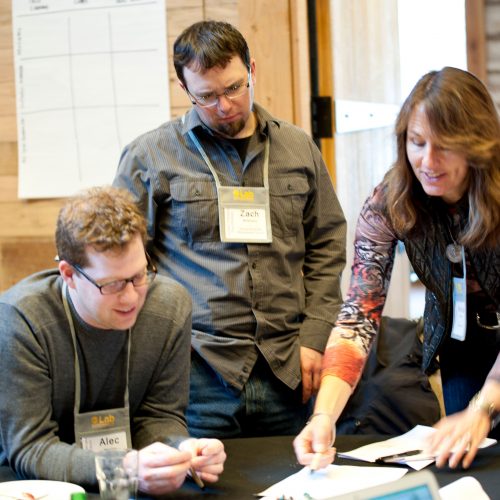
eLab Accelerator 2018
Military Energy Resilience Catalyst (MERC)

Project Objective
Military Energy Resilience Catalyst (MERC) is a project accelerator for DoD installation energy projects. The U.S. DoD is the largest energy consumer in the United States (and possibly the world). MERC has been funded by OSD’s Energy Test Bed to provide up to $1.7M in resources to the Military Services over the next three years. This funding will be leveraged to increase the speed of adoption of innovative technologies, exploring creative value or funding incentives, and/or analyzing the resilience benefits of specific project architectures. MERC services can be requested by the Military Services’ program offices and aligned to specific projects and activities. MERC came to Accelerator in order to align on the ways in which MERC can be most valuable to each of the Armed Services, refined the MERC toolset in light of that feedback, and establish a pathway forward to test and scale the model across the Military.
If scaled successfully, MERC holds the promise meet or exceed military meeting energy goals, including producing 25% energy from renewable sources by 2025 (the Navy has already completed this goal), and reducing energy intensity on installations by more than 30%. Projects will also increase base resilience by allowing bases to operate effectively in blackouts, reducing fueling of diesel generators, and possibly extending these resilience benefits to adjacent communities and critical facilities like wastewater treatment plants and hospitals.
Meeting the military's 25% renewable energy target equates to approximately 7,500 gigawatt hours (GWH) of electricity, equivalent to powering nearly 700,000 average American homes with 100% renewable energy.

Team Members
- Michael Wu, Principal, Converge Strategies
- Wilson Rickerson, Principal, Converge Strategies
- Meredith Pringle, Director, Converge Strategies
- Dan Herway, Director of DoD Energy, Idaho National Laboratory
- Krista Stehn, Director, Opportunity Development, Army Office of Energy Initiatives
- John Kliem, Executive Director, Navy Resilient Energy Program Office
- Shawn Bennett, Senior Advisor, Air Force Office of Energy Assurance
- Tim Tetreault, Program Manager for Energy and Water, DoD ESTCP
Project Description
MERC is a technology transition accelerator supported by a DoD-wide knowledge platform that will build a community of energy resilience practitioners. MERC’s objective is to accelerate the deployment of resilient energy projects on DoD installations. MERC will provide dedicated technical assistance and facilitation services to project teams, gather project information and mature tools and resources into an accessible knowledge platform, and create a community of practice for those creating resilient energy projects for DoD installations.
Progress made to date
The Air Force has funded a MERC pilot program, which is already underway. The DoD has selected MERC to be scaled across the Military Services and significantly increase the level of resources and technical services made available through the program. Within the next year MERC will:
- Build a searchable, user-friendly knowledge platform of project information and resources.
- Facilitate up to six workshops on military installations
- Hold a MERC Summit that assembles all project teams and MERC faculty members
Project background information
- Army Office of Energy Initiatives: http://www.oei.army.mil/
- Navy Resilient Energy Program Office: http://greenfleet.dodlive.mil/energy/repo-3/
- Air Force Office of Energy Assurance: http://www.safie.hq.af.mil/Programs/Energy/OEA/ DoD
- ESTCP Program: https://www.serdp-estcp.org/
Post-Accelerator outcomes
At Accelerator, the team examined how each Service currently develops and deploys energy resilience projects on bases. The team came to understand the differences and similarities in their approaches, and areas where they can work together, and areas where they cannot. The team was able to prioritize critical levers to improve the process of project development and deployment, and from there refined the MERC program to reflect these new needs and opportunities. The team identified actions each needs to take in order to carry the project forward, including how the value of MERC and ways to participate will be disseminated "up and out" to military leadership as well as military base personnel.